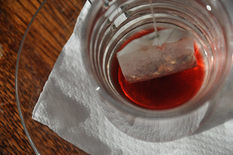Assam Tea Benefits
 Assam tea has a vivid color. Assam tea has a vivid color.
Assam tea benefits are well-known throughout the world. They are derived from the antioxidant content of the tea leaves.
Assam tea is a type of black tea known for its robust body, briskness, tart, malty flavor, and bright color. It is typically marketed as "breakfast" teas and some of its common generic names are English breakfast tea, Irish breakfast tea and Scottish breakfast tea. Assam tea is made from the leaves of the camellia sinensis (assamica) plant. The leaves are dark green in color and are glossy and fairly wide compared to those of the Chinese tea plant. Furthermore, this variety of the tea plant produces delicate white blossoms. Assam tea named after the Assam region of India where it is produced at or near sea levels. The Assam region is found next to the Brahmaputra River and borders Bangladesh and Myanmar (Burma). It is considered the world's largest tea-growing region. It has a long tea-growing season. Though Assam black tea is the best known type produced in the region, it has also been producing smaller quantities of green and white tea types. The Assam region is known to experience high precipitation; and can get up to 12 inches of rain during the monsoon region. The daytime temperature rises to about 103°F, which is extremely and hot. This tropical climate contributes to the distinctive malty taste of Assam tea. The perfect cup of Assam tea is best achieved by placing cold water first in the tea kettle. Take the water to a boil and remove it from the heat shortly thereafter. Place about 1 teaspoon of tea leaves into a pot and pour in the freshly boiled water. Let the mix stand about three to five minutes then strain the leaves and drink. Assam tea gives a variety of health benefits to the drinker by virtue of the rich antioxidant flavonoid and polyphenol content of the camellia sinensis (assamica) plant where it comes from. However, due to the relatively extensive oxidation process it undergoes, assam tea has a lower antioxidant content than its green or white counterparts. Those who add milk to the tea further erode the health benefits as milk is said to diminish the potency of the antioxidants. The following are the health benefits of assam tea:
|
"Tea comforts the spirit, banishes passivity, lightens the body, and adds sparkle to the eyes." Check out the Health Benefits of these Teas and Tisanes:
Check out the Health Benefits from these Herbal Teas:
|